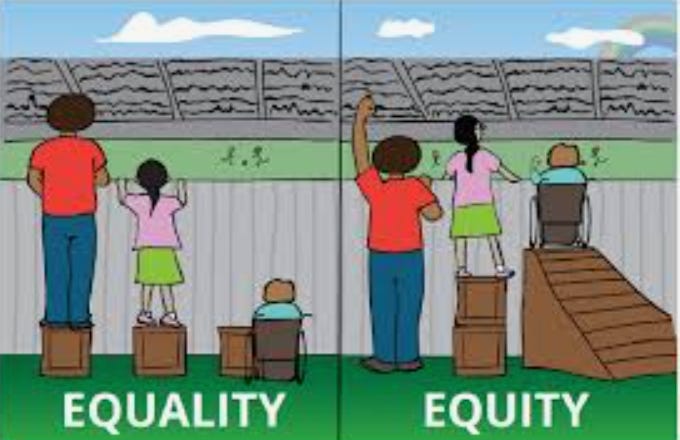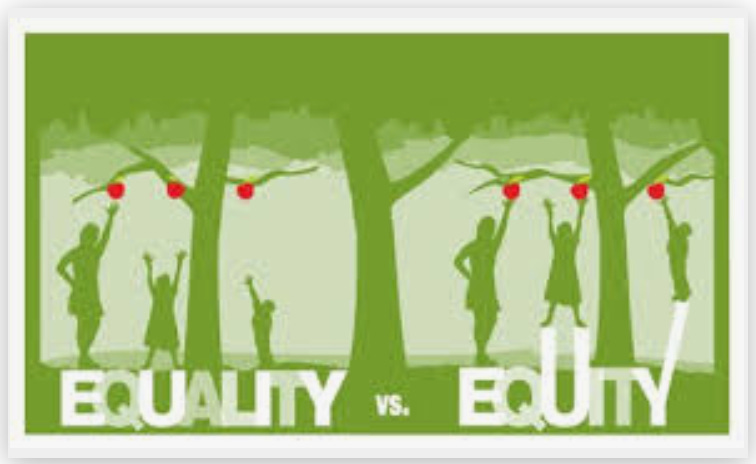The background of the drive to demonize equity.
| Jerry LeClaireMay 12 |
Conservative: “averse to change or innovation and holding traditional values.”
Which “traditional values” exactly?
Forces in the Republican Party (not all Republicans) want to freeze race relations where they were in the mid 20th century. They wish to censor public education and materials in public libraries that challenge either the mythic notions of our founding or any idea that racial equality wasn’t achieved immediately as the result of the American Civil War (or, perhaps for some, achieved by the civil rights legislation of the 1960s). The signs of this form of censorious conservatism are rife, but they are cleverly cloaked in words like “patriotic education,” “Marxism,” and “critical race theory.”
Under the guise of opposing “critical race theory” wordsmiths among Republicans like Christopher Rufo are busy condemning every effort in current law and schooling that is aimed at improving racial and cultural harmony. They condemn such efforts by insisting they are un-American and unconstitutional.
For those who subscribe to skin-based white racial superiority, equity, social justice, and diversity are the new desegregation. They lost the legal battle over desegregation in the 1950s and 60s, so the battlefront has moved—and many of those attacked have yet to even understand the threat.
The main target of the current state-based, Trump Republicans is the concept of social equity. The dictionary defines equity as “the quality of being fair and impartial,” and adds that, in law, equity is “a branch…that developed alongside common law in order to remedy some of its defects in fairness and justice…” Stated openly, fighting any form of equity should be a hard sell. Who would join you in a fight against fairness and justice?
Christopher Rufo makes it clear in his speech at Hillsdale College, pursuing equity is evil and un-American:
Equity…sounds non-threatening and is easily confused with the American principle of equality. But the distinction is vast and important. Indeed, equality—the principle proclaimed in the Declaration of Independence, defended in the Civil War, and codified into law with the 14th and 15th Amendments, the Civil Rights Act of 1964, and the Voting Rights Act of 1965—is explicitly rejected by critical race theorists.
According to Rufo, equity, the quality of being fair and impartial, is at odds with equality, at least the equality proclaimed in our founding documents. He makes this peculiar claim in spite of the dictionary definition of equality, “the state of being equal, especially in status, rights, and opportunities.” His whole argument rests on his noting that unnamed “critical race theorists” “reject” equality, presumably the concept of equality of our founding documents. Considering that our founding documents counted slaves (uniformly dark-skinned Africans) as 3/5 of a person, is it any wonder that someone in the academic discipline of critical race theory might have said that the “equality” expressed in those documents should be rejected?
Since the racist wing of the Republican Party, egged on by Rufo and others, is busy legislating against this straw man of “critical race theory”—and against the equity, social justice, and diversity they wish to tie to those words, it behooves us to understand the argument they’re making.¹
The general concept of equity is that the status quo fails to take into account that different people begin life from vastly different starting lines. To grasp the concept it helps to mentally remove race from the equation for a moment. (I encourage you to google “equity images” for insight into the many ways of framing the idea.) Here’s a good example from that page:

Seen through the lens of the Americans with Disabilities Act (ADA), as in this illustration, the pursuit of equity is clearer. Republicans like Rufo see life as a zero sum game. Government helping the disadvantaged, that is, leveling the playing field in any way, by the logic of such Republicans, must be robbing these same Republicans (or the folk they represent) of what they consider rightfully theirs. In their view, the societal pursuit of equity, especially racial equity, must be resisted. (What they avoid admitting is that their argument stems of an underlying belief in white racial superiority. Any disadvantage a person of color experiences is considered to be damn well that person’s own fault. Suggesting that might not be so, they effectively argue, should be outlawed, suppressed, and, especially, rooted out of libraries and education.)
It is worth pointing out that for some Republicans, namely our Congressional District 5 Representative, Cathy McMorris Rodgers, the pursuit of equity is selective. As a parent of child with Down Syndrome, she broke with her modern day zero-sum, equity-demeaning Republican Party by voting to preserve the ADA. Apparently, pursing equity is worthy of an exception when it gets personal. She voted to keep the ramp depicted in the illustration.
It’s all about the words. Republicans want to subscribe to the sort of “equality of opportunity” (part of the dictionary definition of equality) illustrated below, an “equality” that preserves the privilege of height in the opportunity to pick the apple. That’s a tough sell to my 1960s United Methodist upbringing. They suspect it would be a tough sell to rest of us, too, so Republicans disguise their privilege in a cloak of hate for the nasty straw man of critical race theory, the straw they claim is threatening our mythically pure founding principles.

Those who believe in inherent white racial superiority were the same folk who dragged their feet through the Civil War, supported Jim Crow, and voted against civil rights legislation of the sixties. Now these people twist the word equality to mean the preservation of inequality. These same folk now use the straw man of “critical race theory” to justify damning equity, social justice, and diversity in their latest, most disingenuous, and cleverest attempt to foster a white supremacist doctrine and grip on power.
Pay attention. Push back. We’re headed for rough water.
Keep to the high ground,
Jerry1
There is a worthy parallel between Republican rhetoric around the evils of equity and diversity and the Republican campaign against environmental legislation. Think of the words “critical race theory” as parallel to the Republican railing against the spotted owl. In the latter example the real target was the Environmental Protection Agency (EPA). Attacking the EPA head on would have been just as unpopular (with a large segment of the population) as it would be now to openly assert that all the needed work toward racial equality was finished in the 1960s. The solution? Redefine the argument. Get out in front with attacks from Tucker Carlson and other racist mouthpieces before most people even understand what is being attacked.